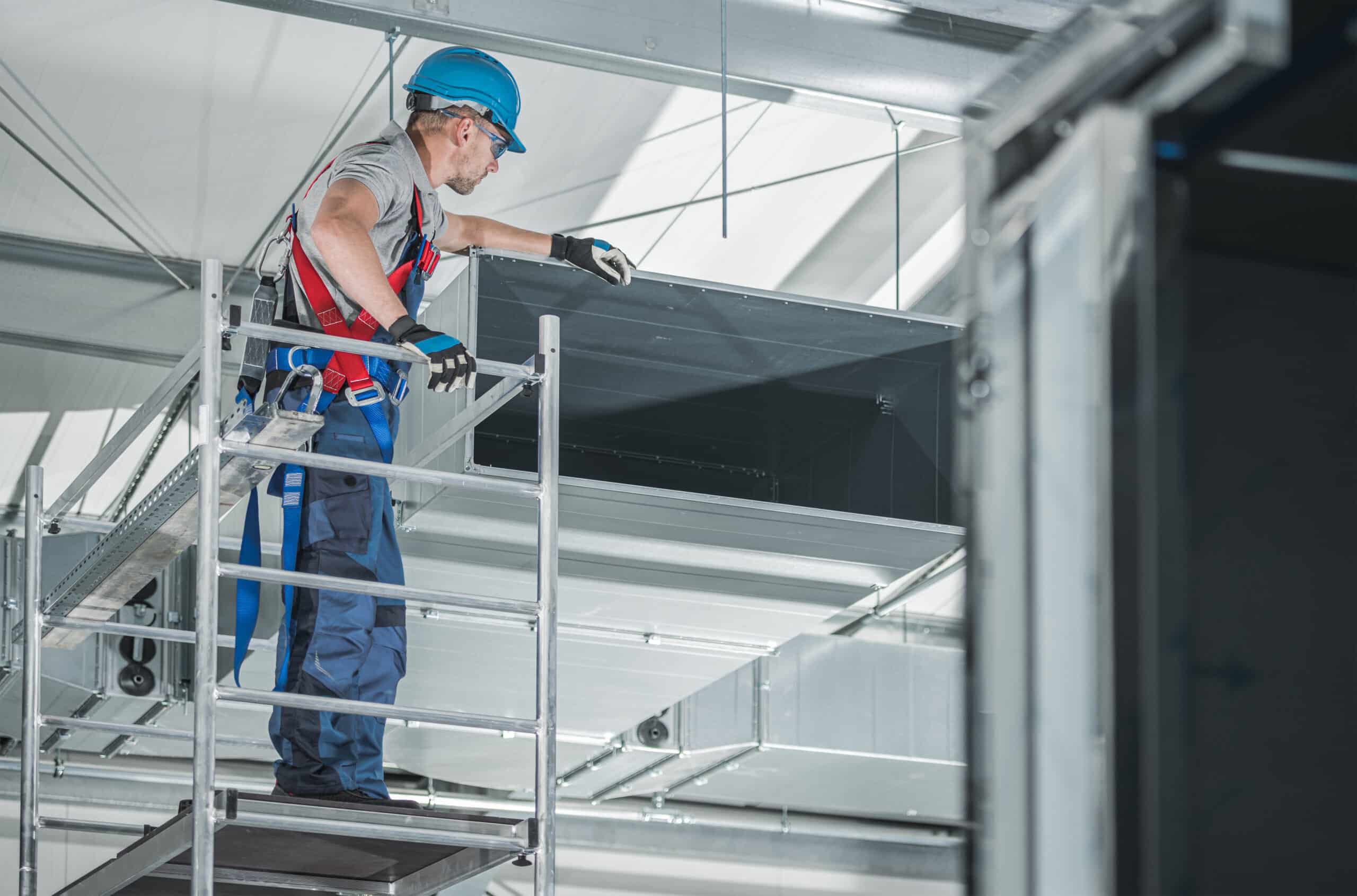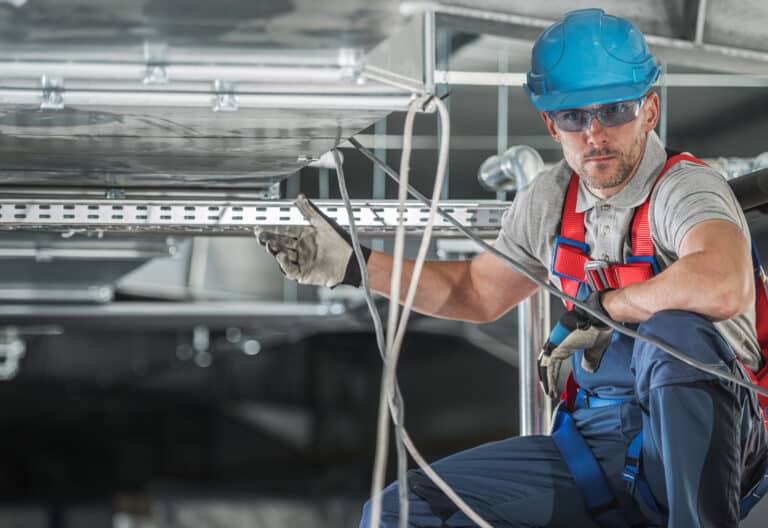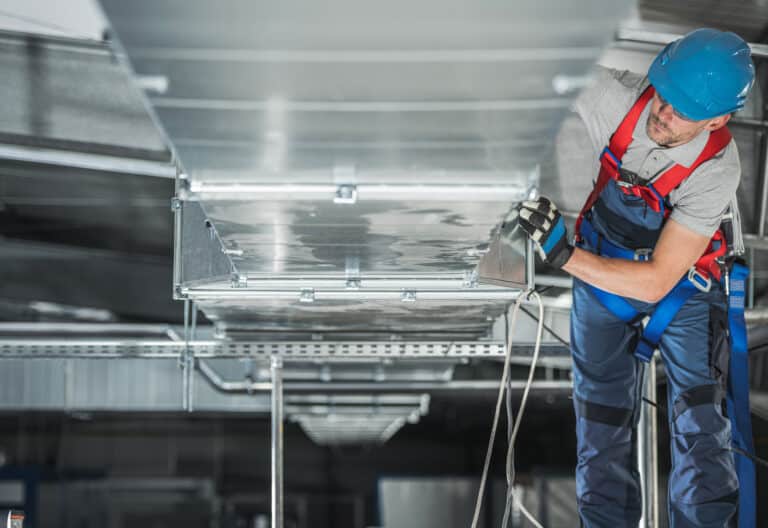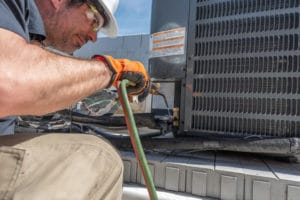Have you heard about what is an HVAC technician and want to know more about their day-to-day duties?
In this guide, we share the top 10 duties of an HVAC Tech, the skills you need, plus the major differences between Residential HVAC Technician & Commercial HVAC Technician.
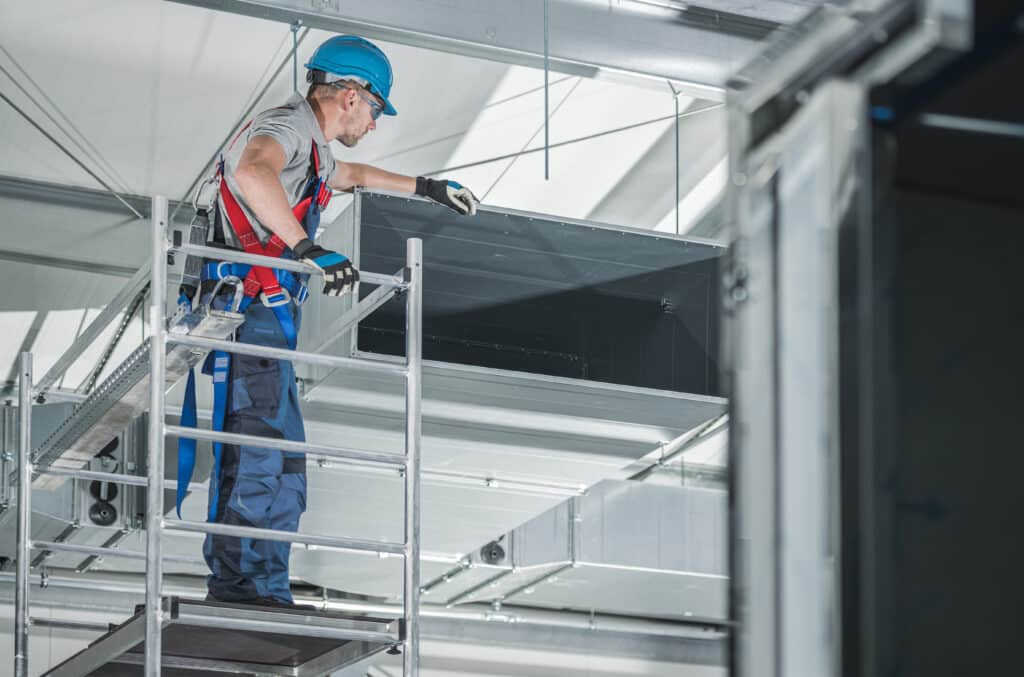
Definition
HVAC stands for ‘Heating, Ventilation & Air Conditioning’, and HVAC Technicians are responsible for maintaining these systems and appliances.
But other than this, they might also be expected to handle operations related to refrigerators; for this reason, they are also known as HVACR Technicians.
Top 10 Duties of an HVAC Technician
Below are the top 10 duties that an HVAC Technician is expected to perform:-
1. Install HVAC Systems – This is one of the primary duties an HVAC Technician must deliver. They actively install systems at big buildings, offices, or residential locations.
HVAC Techs might also handle Ductwork and electrical wiring during installation. The installation work can occur either at residential premises or commercial places; this completely depends upon the customer’s demand.
2. Repair HVAC Systems – HVAC Technicians are responsible for repairing HVAC systems. After receiving a customer complaint, an HVAC Technician diagnoses the system and suggests repairs.
Most of the time, this can include replacing parts, repairing leaks, or even testing the wiring and ensuring it works effectively.
3. Perform Maintenance – An HVAC Technician is required to maintain the systems.
You can spot an HVAC Technician doing routine maintenance checks such as cleaning the system, replacing filters, and even checking for leaks.
4. Troubleshoot Issues – HVAC Techs are required to troubleshoot systems and identify any issues that may arise in said systems or appliances.
This requires a thorough understanding of the components and the ability to fix the issues quickly.
5. Test HVAC Systems – As an HVAC Technician, you must be able to test the functionality of different HVAC systems. This involves measuring airflow, checking for leaks, and testing the system’s electrical components.
6. Educating Customers – Apart from just installing systems and repairing them, an HVAC Technician is often expected to brief customers about the HVAC Systems.
You are responsible to inform them about the best practices and maintenance and also suggesting replacements whenever required.
7. Safety Procedures – As an HVAC Technician, you must know about different safety procedures. This may involve wearing protective gear and ensuring the electrical components are turned off.
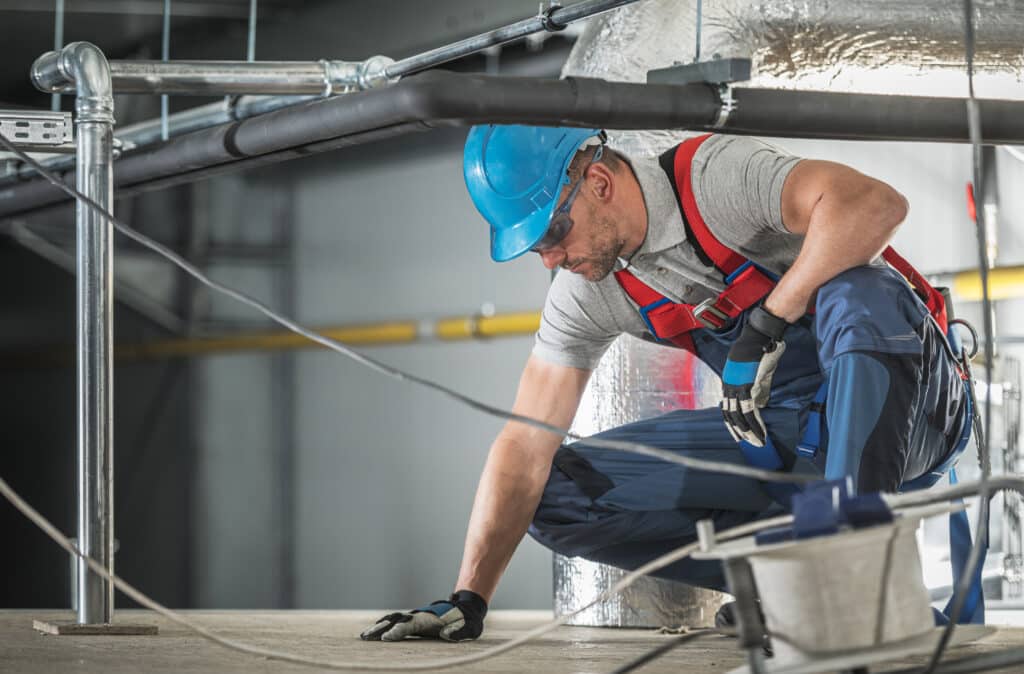
An HVAC Technician has to follow local codes and regulations as well.
8. Keeping up With The Industry– You’ll find most HVAC Technicians up to date with industry trends and recent activities. This can involve reading industry publications and staying informed about new technologies in the market.
9. Work with Customers – HVAC Technicians work closely with customers to understand and fulfill their needs. You have to carefully address their concerns and understand what they are looking for.
Based on the problem or requirement, as a technician, you’re expected to suggest the best course of action.
10. Maintain Records – HVAC technicians must keep thorough records of their work. This incorporates reporting support and fixing work, monitoring parts utilized, and recording any issues with the framework.
This documentation is crucial in ensuring the system continues functioning properly and complies with local regulations and codes.
Also read: HVAC technician job description
Top Skills of an HVAC Technician
Here are the top 10 skills an HVAC technician should have –
1. Reading Blueprints – This is one of the crucial skills for an HVAC Technician to master their role. Before installing any system or appliance, they should know the specifications of it in Blueprint.
If HVAC Technicians can understand the details of any system or appliance in Blueprint, they will be able to install the systems well without little or no mistakes.
If they know about the formatting or nuances of the Blueprint, they can easily place the systems in the right direction. HVAC Technicians who know how to read blueprints can also avoid extra time that is usually invested later in maintenance or repair.
2. Effective Communication – HVAC Technicians often communicate with colleagues and customers on various aspects. The HVAC Technicians should be effective communicators when it comes to dealing with people.
HVAC Technicians can solve customer issues by listening to them patiently and addressing their concerns accordingly.
3. Troubleshooting Skills – There can be issues with the systems or an issue with a wire, and as an HVAC Technician, you should be aware of troubleshooting problems.
You should be willing to answer questions about your work, think of creative solutions, and implement repairs.
4. Customer Service – An HVAC professional must be good at customer service because these jobs often involve interacting with clients. Techs should strive to build a network of devoted customers and professional connections with their clients.
5. Time Management – HVAC technicians usually manage many clients and may have multiple daily appointments. Time management skills enable HVAC professionals to organize their schedules and arrive on time for multiple appointments during a workday.
They can provide excellent customer service and make good use of their time if they can prioritize and manage their tasks.

6. Critical Thinking – Critical thinking is a skill that enables HVAC professionals to respond quickly to changing circumstances and come up with alternative solutions to complex problems.
They could also examine the problem from various points of view (from other technicians) to come up with an appropriate solution.
7. Hand and Power Tool Experience – To ensure safety on any specific job site, it is essential to be able to use hand and power tools correctly.
This knowledge, which is typically acquired through training and experience, allows professionals to use common tools like a screwdriver and drill.
Here is more on: Online HVAC training
8. Mechanical Skills – HVAC techs work with different appliances. They are required to be equipped with Mechanical skills and should know how to disassemble and reassemble machinery efficiently.
9. Computer Skills – Understanding how to use basic computer programs effectively is often crucial for HVAC professionals because they frequently use different software to control and maintain systems.
They can use these programs to, among other things, figure out what’s wrong and keep track of how many hours they worked.
10. Attention to detail – They need to be aware of minor details that can be useful while fixing any system or while performing installations.
Differences Between Commercial and Residential HVAC Technicians
There are a few differences between commercial and residential HVAC Technicians; let’s take a look at some of the differences:-
1. Commercial HVAC Technicians often require more education
Commercial HVAC Technicians work with heating and cooling systems that are typically larger and more intricate. They deal with systems that heat and cool entire commercial buildings, not just single-story houses.
Commercial HVAC technicians typically need to go above and beyond basic education and training and understand the complexities of large systems.
For instance, all HVAC technicians must have the EPA 608 certification, but commercial technicians will likely also need Universal certification (Level 4) to be able to work on both large and small appliances.
Read more on: HVAC technician certification
2. Commercial HVAC Technicians Have Fixed Hours
Commercial HVAC Technicians usually serve businesses that have fixed working hours. Commercial technicians typically have a similar work schedule and are less likely to encounter any after-hour emergencies because this is the only time your customer will be present.
On the other hand, Residential HVAC technicians can get occupied with work anytime.
Their work hours largely depend on the availability of the client, which can vary.
3. Commercial HVAC Technicians Often Have Harsher Working Conditions
Commercial technicians work on large commercial systems that are typically lodged in a single location, whereas residential technicians typically service equipment that is mostly indoors.
Most of the time, Commercial Technicians are expected to work and spend their days on top of the building, fixing some systems or checking the appliances.
If you want to opt for Commercial HVAC Tech, be prepared to work regularly in a tough environment.
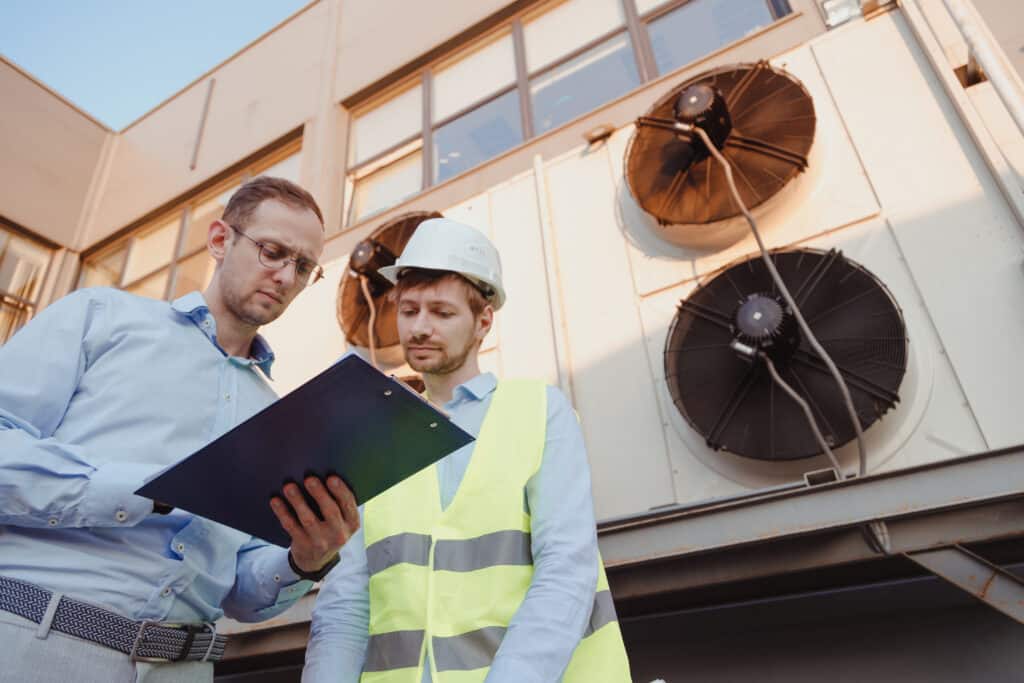
4. Commercial HVAC Tech Is More Competitive
Commercial HVAC professionals are paid more on average than residential HVAC professionals due to the size and scope of their projects as well as the complexity of their equipment.
To make the transition from residential to commercial HVAC work, applicants must be prepared to stand out from the crowd of applicants.
This is where extra education or certifications might not just assist you in handling your work but also make you shine in front of employers.
5. Residential HVAC Tech Is More Personal
One part of working in warming and cooling that numerous private experts appreciate is the relationship they have with their clients. After years of working in the same position, many technicians develop consistent relationships with the people they work with.
However, this social aspect of commercial HVAC needs to become more evident. Generally, your employer arranges and reviews your contract; you show up at the location, complete your work, leave, and then the receipt gets shipped to their charging division.
Although there are a lot of advantages of working as a commercial HVAC, those who particularly enjoy interacting with customers and developing networks should note that these aspects are less prevalent in this job role.
There are both similarities and differences between residential and commercial HVACs, and both careers have advantages and disadvantages. But it is essential to note that both fields offer a valuable and in-demand service to your community.
Related Resources:
- HVAC technician salary
- HVAC vs Electrician
- HVAC service technician
- HVAC technician license
- HVAC technician salary California
